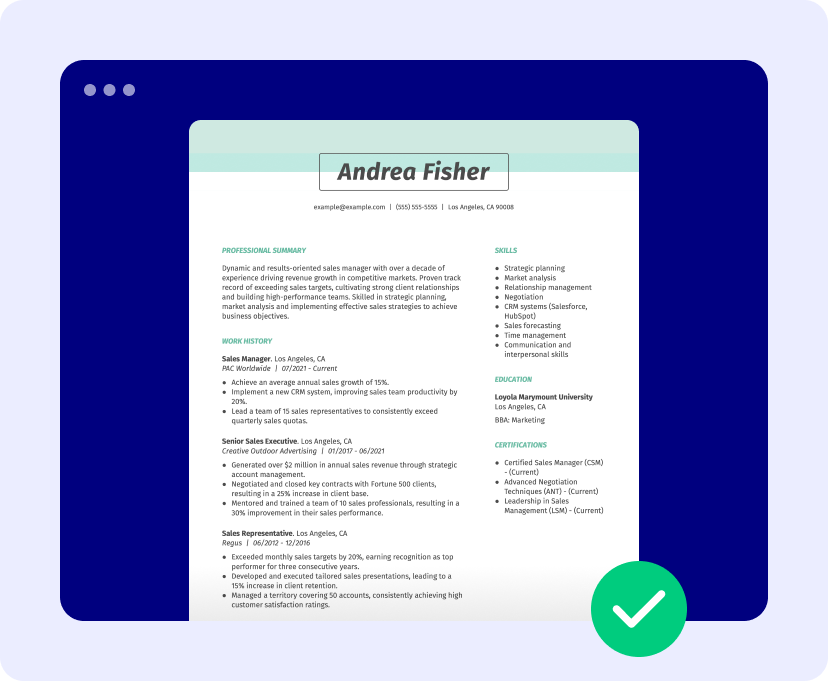45 Resume Tips for Getting a Job
We cover everything about writing a good resume, from formatting to tips for each section. We also share unique tips for older workers and those with no work experience!
Hired By:*


Get ready to land that dream job! Our resume-writing tips will help you prime your resume for recruiters and get you that coveted interview. Learn top industry pointers for your resume’s key sections, formatting, keywords and more.
The 5 best resume tips to
land a job
Constantly tailor your resume to each job you apply to.
Writing one single resume and using it to apply to every job isn’t an effective strategy. Instead, tailor new resume versions for each job application to ensure you’re showcasing the skills and qualifications recruiters want to see for that specific role.
Include keywords from the job description.
Employers will include industry-specific skills and keywords from the job description that recruiters expect you to have in your resume. Applicant tracking systems (ATS) also scan for these exact words and terms to decide if your resume meets the employer’s requirements. Always review job ads, note specific skills and qualifications, and include them as is on your resume.
Choose a resume format that helps you.
You can use three recruiter-accepted resume formats to organize your resume sections. Depending on your years of experience and career progression, the chronological, functional and combination resume formats will highlight different strengths while downplaying weaknesses. Learn which resume format is suitable for you in our resume formats guide.
Optimize your resume’s language with action verbs.
When writing your resume, you can employ some unique tricks to make your resume’s content more concise and easier to read. Begin sentences with strong words like “achieved,” “conducted,” “restructured,” and other action verbs recruiters notice. Avoid “I” statements that become redundant. Also, eliminate any unnecessary articles such as “the,” “a,” or “an” to reduce word count and length. It might seem unnatural at first, but recruiters expect this.
Be consistent with tense.
A small but essential detail when writing your resume is to ensure you use the proper verb tenses. It’s standard practice to write in the past tense when sharing your accomplishments from jobs you’ve previously held. However, if you’re currently employed and listing that job in your resume, write your bullet points in the present tense.
Customize your resume beyond the five resume sections.
Your resume should always include the five essential resume sections. However, you would benefit from having additional custom sections to showcase other achievements that don’t necessarily fit into your work history or skills. Different sections for Certifications, Awards, Languages or Extracurricular Activities are great ways to share added value in your job application.
Resume tips for the work experience section
The following resume tips will make it easy for recruiters to read and remain engaged with your resume’s work experience.
Keep only the most relevant and recent experience.
If you’ve been in the workforce for over a decade, including every job you’ve had back to your first internships is unrealistic. If applying to a mid-level or senior role, you can mention the jobs you held in the last 10 years of your career. This way, you can offer a more current picture of your skill set and knowledge.
Organize your roles in reverse-chronological order.
When listing your working experience, always begin with your current or most recent job and work backward to your oldest roles. Doing so will allow recruiters to know your current experience level and understand what new skills you’ll bring. Continue listing your jobs in this order so recruiters can quickly skim the most relevant experience first and then read the rest if you seem like a potential candidate.
Focus on specific achievements instead of job duties.
When writing your resume’s work experience, simply listing what you were responsible for on the job will make recruiters flip onto the next applicant’s resume. A recruiter knows what employees generally do in each role. It’s your job to show them how you exceeded your responsibilities and achieved unique results that make you a desirable candidate.
Include numbers and metrics to demonstrate achievements.
Show employers the real impact of your accomplishments by speaking in their language: numbers. For example, back up your claims with how much budget you helped the company save or percentage increases to illustrate higher client retention. These quantifiable achievements add proof of how good of a candidate you are.
With all these work experience resume writing tips, you will have a bullet-proof work experience section that captivates employers’ attention.
To see these tips in action, check out how this sales associate describes their most recent job as a sales floor attendant:
Work Experience
Sales Floor Attendant | 02/2019 – 03/2023
The Fashion Specialist — Los Angeles, CA
- Employed superb customer service and product recommendations to increase individual sales by 40% each year, becoming lead salesperson twice consecutively.
- Ideated and executed rebranding campaigns, including social media, store interior design and researching new merchandisers. Efforts resulted in biggest yearly revenue in store’s history.
- Trained over a dozen sales attendants and shop assistants in customer service, client retention, visual merchandising, business administration and sales techniques.
If you need extra help updating your work experience to look like this, use our Resume Builder, where you’ll find dozens of similar content suggestions based on the job title you’re applying for.
Resume tips for the education section
Share your most recent degree first.
Like the work experience section, when listing multiple degrees, you should begin with your most recent degree, i.e., your doctorate, then your master’s and then your bachelor’s degree.
If you possess a college degree, omit your high school diploma.
Sharing your high school graduation and bachelor’s degree is a formality that becomes redundant. Since you obligatorily need a high school diploma or GED to begin university, you should omit this educational achievement in favor of more relevant information, such as any minor degrees or relevant coursework.
Omit graduation dates to avoid bias.
In most cases, sharing your graduation date is a way for recruiters and employers to guess your age by assuming you’d finish a four-year bachelor’s degree right after graduating high school at 18. Since this isn’t the case for everyone, and you can finish any degree anytime, it’s best to avoid these hiring biases by not sharing graduation dates.
Current students should share their anticipated graduation date.
You can share your uncompleted degree in your resume if you’re currently enrolled in an academic program. You will share the degree title, the university or institution you’re attending and the city and state it’s located in. In addition, you will write: “Expected graduation date June 2024”, for example.
Add complimentary educational information when relevant.
Although all you need to write an education resume section is your degree title, school name and location, you can add more details to boost this section. You can share that you’ve completed seminars on current industry topics or graduated summa cum laude. These achievements are great additions, especially for job seekers with little to no experience — and remember, only share your GPA if it’s 4.0+.
Resume tips for the skills section
List six to eight skills in your main skills section.
All resumes should have at least one dedicated skills section where you share six to eight of your most job-relevant skills. Share them in a simple bulleted list that recruiters can skim and determine if you possess the basic requirements for the role.
Include a balanced mix of soft and hard skills.
You should include hard skills reflecting your subject expertise for the job and soft skills demonstrating your ability to work well with others and be productive. Both types of skills are equally important.
For example, even if a job seems more “hard-skills-oriented” like software engineering, soft skills will help set you apart from the competition with leadership, organizational and communication abilities.
Incorporate skills throughout other sections of your resume.
You don’t have to limit yourself to six skills on your resume. You can cleverly add skills to other sections, such as the resume summary or work experience, by describing what skills you used to accomplish specific tasks and achievements.
Never repeat a skill on your resume.
Including extra skills and relevant resume buzzwords beyond your main skills section can help highlight your knowledge, but repeating the same ones too often can hurt you. Recruiters and applicant tracking systems will notice this and may take points off your resume, risking your chances of moving on to the second round.
Resume formatting tips
If you’ve written a resume from scratch before or have used a resume template you found on the internet, you know that resume formatting can be an uphill battle.
We compiled some of the best formatting resume tips to help ensure your resume has a well-organized layout and is visually appealing so recruiters can quickly get to what matters.
Opt for a professional and simple resume template.
A well-designed resume template is key to ensuring your resume stands out from the resume pile and organizes your information neatly. Your resume template should include some design component, so it doesn’t look like you just printed a Word document.
However, the design elements shouldn’t overpower the content to the point of distraction. In our resume template library, you can find dozens of templates created by professional graphic designers that are appropriate for any job and industry that suit your style.
Put your contact information front and center.
Ensure employers can easily connect your name to those incredible achievements in your resume by prominently showcasing your contact information. Try to share your contact information at the very top of your resume — whether centered, left-aligned or right-aligned. Try to avoid resume templates that put your contact information in more conspicuous places for the sake of design.
And remember that your contact information should include:
- Your full name
- Your phone number
- A professional email address
- Your city and state
Don’t share your precise home address.
Although this used to be standard practice for resumes when traditional mail was more commonly used among job seekers, the reality is that your communication with potential job seekers will happen mostly through email.
Sharing your full street address is not only redundant, it can put you at risk of shady activity. Once you send your resume via email, it can be forwarded to anyone and a stranger having access to your home address can pose a security risk.
Add your professional social media accounts or portfolio.
Again, since you will likely email your resume to an employer, you can include hyperlinks to relevant social media accounts where you share professional accomplishments or network with colleagues, such as your LinkedIn or Twitter.
If you’re a creative professional, you will benefit from also linking your portfolio on your contact information section, so employers can easily evaluate your body of work.
Avoid design elements the ATS can’t read.
Although it’s wise to have a visually engaging resume template, many applicant tracking systems don’t properly scan design elements like:
- Graphs
- Tables
- Skill-level bars
- Photos
- Logos
- Icons
- Text boxes
- Text columns
Keep this in mind, especially when going through an online application process or applying for a large company, which is likely to use these ATS to filter its applications.
Use a professional font.
Use fonts that are easy on the eyes like:
- Arial
- Calibri
- Verdana
- Georgia
- Times New Roman
Keep your font size between 10 and 12 so recruiters don’t have to squint to read your resume, and you can also use as much space as possible on the page.
Your line spacing should be 1.5.
To ensure easy readability, the space between each line of text should be 1.5 long. This allows you to keep your resume under one or two pages, while still having a balance between white space and text.
Keep your resume margins one-inch wide.
One-inch page margins allow for a balanced resume on all sides and provide enough white space to not saturate the resume with text. This margin width is the standard for all business letters and documents.
If this seems like many tips to remember and execute, you can use our Resume Builder to format your resume with these formatting rules automatically.
Our Builder is equipped with user-friendly dragging adjustment tools that customize margins, text size and more so you can see the changes in real time and edit easily.

Resume tips for job seekers with no experience
If you’re drawing a blank on what to include on your resume if you’re a teen or a recent graduate, we’ve got the resume tips for a good resume that will impress recruiters.
Don’t ignore non-traditional work experience.
If you lack formal work experience — like paid, full-time employment — you don’t need to leave your work experience blank. Think about part-time or seasonal jobs, babysitting during school, helping out at your family business or any graphic design or social media management you helped a friend with on a project. All these experiences count as work and demonstrate discipline, commitment and effectiveness.
Craft a strong resume objective.
Although the resume summary is the most common and general statement to begin your resume, you might notice you seem to fall short on achievements when writing it. If you’re a job seeker with little or no formal work experience, you should opt for a resume objective that:
- Clearly defines your career aspirations and role-specific goals
- Establishes which skills you possess to succeed in these goals
- Mentions an example of an accomplishment that demonstrates your capabilities
Find examples of resume objectives for your no experience resume in our resume objectives guide.
Minimize work experience.
If you’ve only had one or two formal work experiences, feel free to minimize your work experience section by only listing the job titles, employer’s name, employment location and employment dates while omitting the descriptive bullet points you find in a traditional work experience section.
Include an expanded skills section.
The best way to write a resume without experience is to use a functional resume format with an expanded skills section. Instead of outlining your achievements under your work experience section, you will replicate this under your professional skills.
For example, you’ll pick three or more skills you excel at and require for your desired position. Under each of those skills, you will add a few bulleted sentences describing various achievements where you utilized that skill to complete the task successfully.
See how this teen showcases their sales skills for a part-time job in retail:
Skills
Sales
- Exceeded our $4,000 goal for our senior car wash fundraiser by 35% by employing on-site marketing of add-on services to increase total revenue.
- Became second-highest-selling Girl Scout in North Carolina Coastal Pines Scouting portal in 2021, selling 3,673 boxes.
- Successfully sold over 30 pizzas per shift when assisting cash register manager in Joe & Joe Pizza Parlor.
Include additional sections to show off other accomplishments.
Despite not having formal work experience, you still have a lot to offer from other types of achievements in your academic or personal life. You can include extra resume sections to show off these accomplishments, such as:
- Extracurricular activities
- Memberships (to school clubs or associations)
- Volunteer work
- Languages
- Certifications
Resume tips for older workers
If you’ve had a long career spanning over 20 years or have retired and want to rejoin the workforce, these resume tips will help you write an attractive resume that helps you land a job and avoid unfair hiring biases.
Limit your work experience to the past 10 to 15 years.
Even if you possess more than 10 years of experience, you should only feature the jobs you held for the last 15 years. Keeping only these more recent roles helps you avoid recruiters noticing that you’ve been in the workforce longer and immediately estimating your age.
Besides, a resume isn’t a curriculum vitae; you always want to showcase the most relevant information for the job you’re applying for.
Remove graduation dates from your education.
Another easy way for recruiters to guess your age is by looking at the year you graduated from university. If you possess college degrees, simply mention the degree titles and the name and location of the university or institution you attended.
Showcase newly acquired skills.
When listing your skills, try to avoid being as general as possible and tailor your skill set according to your desired job. Feature skills you’ve developed recently and shine a light on your technological abilities. Even if a recruiter or employer knows your age, they’ll realize their biases were untrue when they see an up-to-date resume.
Refresh your resume template.
If your resume template looks a little outdated, it’s time to opt for a modern and sleek design that shows you’re in on the industry trends and can handle digital tools. We have a lot of modern and traditional templates in our resume templates library that you can quickly fill in and customize within our Resume Builder.
Write a resume summary highlighting your most impressive achievements.
Being an older worker shouldn’t carry a stigma; on the contrary, you hold an immense amount of work experience and have developed many skills to make you a pro in the workforce. Use the resume summary to showcase those career highlights that show recruiters you’re the top candidate for the job.
PRO TIP
Although it’s customary to begin the resume summary by stating your years of experience, avoid age-guessing by mentioning you “possess 10+ years of experience” instead.
Resume tips for getting promoted
If you’re applying for a promotion within your company, the way you write a resume is slightly different. When vying for a promotion, you want to show you possess relevant experience while showing you have developed skills to catapult you into the next level of your career.
Use a combination resume format.
If you want to land that dream promotion and show your employer you’ve got the skills and experience to move up the career ladder, use the combination resume format.
Combination resumes are ideal for mid-level professionals because they showcase a sturdy work experience section but complement it with additional sections such as the summary of qualifications and additional sections for more skills.
Feature transferable skills.
If you’re moving to a different department or industry, you might possess many skills that don’t seem to apply to your new dream job. Think again, though. You will find that you possess plenty of skills that serve you well across various jobs and industries, also called transferable skills.
For instance, both marketing and customer service professionals would benefit from sales skills, negotiation and knowledge of project management ideals since both industries use these.
Build a strong pitch in your summary of qualifications.
Suppose you’re applying for a role open to applicants outside your company. In that case, you want to take advantage of your inside knowledge and show you have precisely what the job and company need. In the summary of qualifications, you need to feature skills and accomplishments that directly relate to the job requirements
For example, you can share:
- How a recently acquired PM certification will help you streamline marketing efforts
- How you’ll utilize skills you developed in your previous role or department to improve department collaboration
- How your experience in finance will help you remain under budget in your new position
Resume tips for finishing touches
Lose the old “references available upon request.”
Recruiters and employers expect you to have references; if they need them, they’ll request them. Including that phrase adds no value to your resume, takes away space from more helpful information and can be seen as a resume faux pas.
Appropriately name your resume files.
Don’t save your resume untitled or with a random alphanumeric code. Instead, save it with your name and desired job title. First, a randomly named resume can get lost between all your documents. Second, recruiters can quickly locate yours by name and job title if they download multiple resumes. Bonus points for making their life easier!
Save your resume as a PDF file format.
Unless your employer or online application form states otherwise, always save your resume as a PDF file. Your resume can’t be tampered with as a PDF, and recruiters and employers will always be able to open it, no matter their computer’s operating system.
Use a spell checker or proofreader to review your resume.
A second pair of eyes, whether human or digital, will be key to spotting any grammatical errors or accidental typos you missed when writing your resume. Ensure you employ a professional proofreader such as a copywriter, friend or college professor, not just anyone. You can also use free online spell checkers like Grammarly or use the integrated spell checker in our professional Resume Builder.
Save multiple versions of your resume.
We always recommend you write a new resume for each job application since different roles will emphasize other skills and qualifications. However, you shouldn’t delete these resumes if you do or don’t get a job.
Keeping these multiple versions saved will help you keep a database of resumes with all your professional information. Ultimately, you’ll never have to rewrite an entire resume again. Instead, simply copy-paste and edit information from your existing resumes.
If you need a safe place to save these resume copies, our Resume Builder offers unlimited cloud storage for all your resumes and cover letters so you can have all your job application materials in one place.
How We Reviewed This Article
Over the past 15 years, we’ve helped more than 10 million job seekers build stronger cover letters, discover their career paths, interview confidently, and boost their chances of finding the right job faster. Review our Editorial Policy to learn more about our process.














